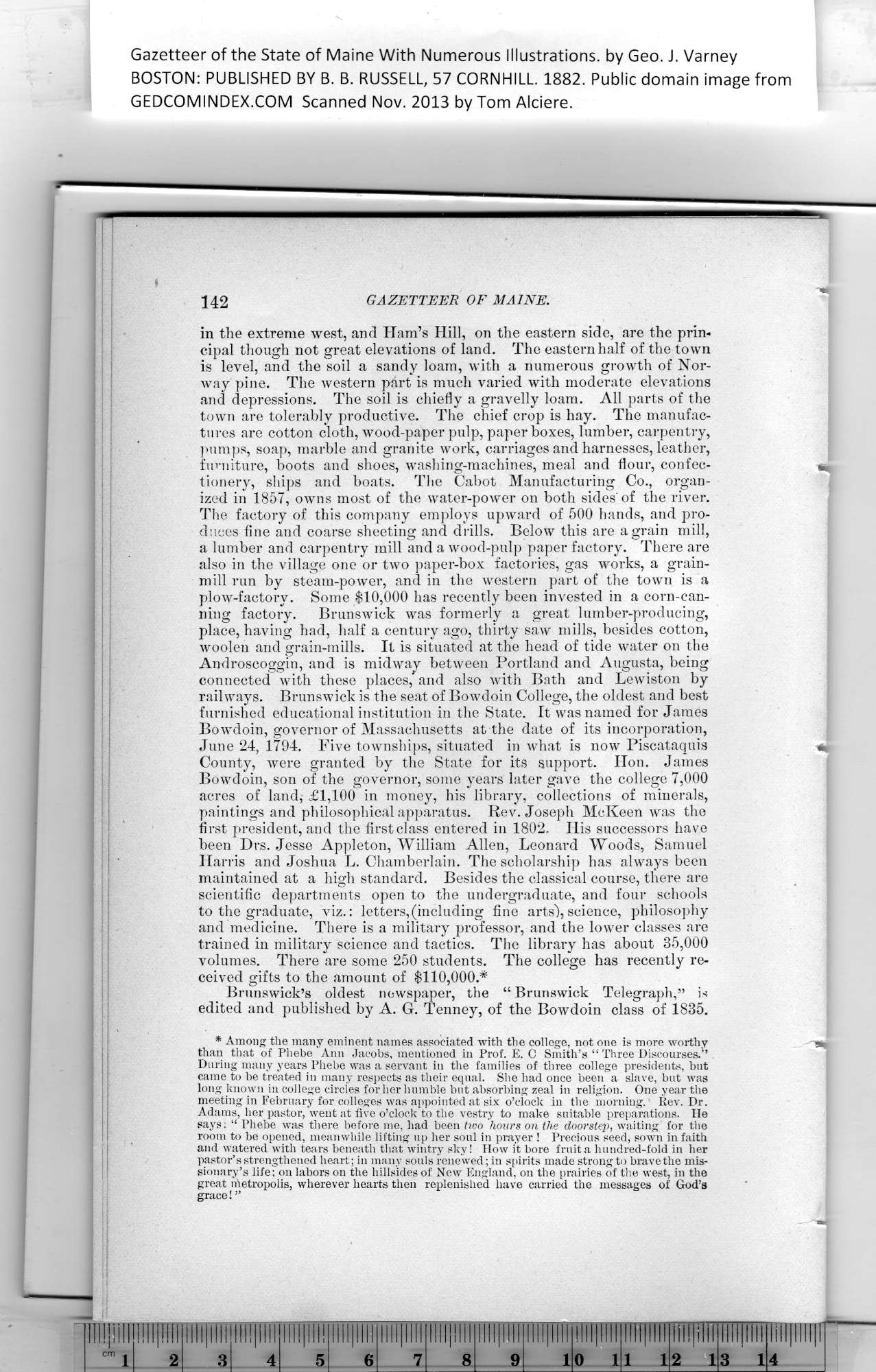|
Gazetteer of the State of Maine With Numerous Illustrations, by Geo. J. Varney
BOSTON: PUBLISHED BY B. B. RUSSELL, 57 CORNHILL. 1882. Public domain image from
142 GAZETTEER OF MAINE.
in the extreme west, and Ham’s Hill, on the eastern side, are the prin-
cipal though not great elevations of land. The eastern half of the town
is level, and the soil a sandy loam, with a numerous growth of Nor-
way pine. The western part is much varied with moderate elevations
and depressions. The soil is chiefly a gravelly loam. All parts of the
town are tolerably productive. The chief crop is hay. The manufac-
tures are cotton cloth, wood-paper pulp, paper boxes, lumber, carpentry,
pumps, soap, marble and granite work, carriages and harnesses, leather,
furniture, boots and shoes, washing-machines, meal and flour, confec-
tionery, ships and boats. The Cabot Manufacturing Co., organ-
ized in 1857, owns most of the water-power on both sides'of the river.
The factory of this company employs upward of 500 hands, and pro-
duces fine and coarse sheeting and drills. Below this are a grain mill,
a lumber and carpentry mill and a wood-pulp paper factory. There are
also in the village one or two paper-box factories, gas works, a grain-
mill run by steam-power, and in the western part of the town is a
plow-factory. Some $10,000 has recently been invested in a corn-can-
ning factory. Brunswick was formerly a great lumber-producing,
place, having had, half a century ago, thirty saw mills, besides cotton,
woolen and grain-mills. It is situated at the head of tide water on the
Androscoggin, and is midway between Portland and Augusta, being
connected with these places, and also with Bath and Lewiston by
railways. Brunswick is the seat of Bowdoin College, the oldest and best
furnished educational institution in the State. It was named for James
Bowdoin, governor of Massachusetts at the date of its incorporation,
June 24, 1794. Five townships, situated in what is now Piscataquis
County, were granted by the State for its support. Hon. James
Bowdoin, son of the governor, some years later gave the college 7,000
acres of land, £1,100 in money, his library, collections of minerals,
paintings and philosophical apparatus. Rev. Joseph McKeen was the
first president, and the first class entered in 1802, His successors have
been Drs. Jesse Appleton, William Allen, Leonard Woods, Samuel
Harris and Joshua L. Chamberlain. The scholarship has always been
maintained at a high standard. Besides the classical course, there are
scientific departments open to the undergraduate, and four schools
to the graduate, viz.: letters,(including fine arts), science, philosophy
and medicine. There is a military professor, and the lower classes are
trained in military science and tactics. The library has about 35,000
volumes. There are some 250 students. The college has recently re-
ceived gifts to the amount of $110,000.1
Brunswick’s oldest newspaper, the “ Brunswick Telegraph,” is
edited and published by A. G. Tenney, of the Bowdoin class of 1835.
1
Among the many eminent names associated with the college, not one is more worthy
than that of Phebe Ann Jacobs, mentioned in Prof. E. C Smith’s “ Three Discourses.’’
During many years Phebe was a servant in the families of three college presidents, but
came to be treated in many respects as their equal. She had once been a slave, but was
long kno wn in college circies for her humble but absorbing zeal in religion. One year the
meeting in February for colleges was appointed at six o’clock in the morning. Rev. Dr.
Adams, her pastor, went at five o’clock to the vestry to make suitable preparations. He
says: “ Phebe was there before me, had been two hours on the doorstep, waiting for the
room to be opened, meanwhile lifting up her soul in prayer ! Precious seed, sown in faith
and watered with tears beneath that wintry sky! How it bore fruit a hundred-fold in her
pastor’s strengthened heart; in many souls renewed; in spirits made strong to brave the mis-
sionary’s life; on labors on the hillsides of New England, on the prairies of the west, in the
great metropolis, wherever hearts then replenished have carried the messages of God’s
grace! ”
PREVIOUS PAGE ... NEXT PAGE
This page was written in HTML using a program written in Python 3.2
|
